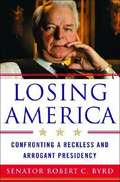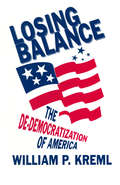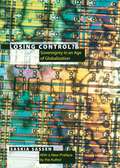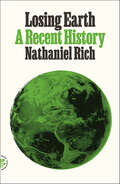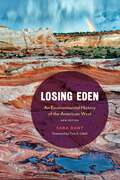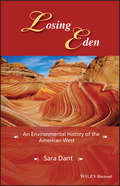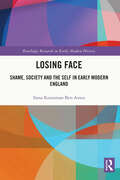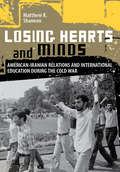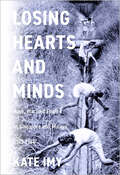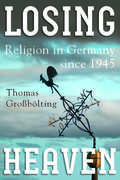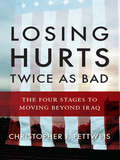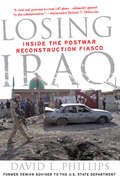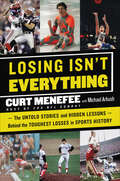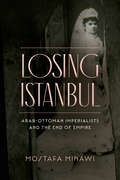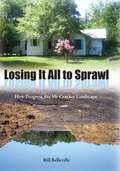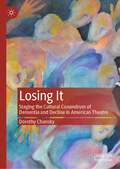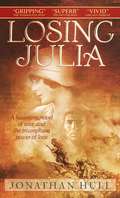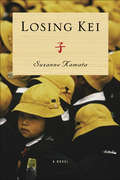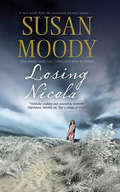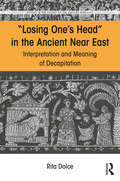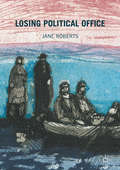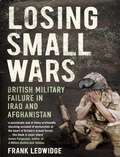- Table View
- List View
Losing America: Confronting a Reckless and Arrogant Presidency
by Robert C. ByrdThe long-time Democratic Senator from West Virginia gives his perspective on Bush's policies, drawing on his experience as a senator since the Kennedy era, as well as his knowledge of America's history and Constitution.
Losing Balance: De-Democratization of America
by William P. KremlThis text offers students a fresh, comprehensive, multidisciplinary entry point to the broader Middle East. Readers will come away from this book with an
Losing Control? Sovereignty in the Age of Globalization
by Saskia SassenExamining the rise of private transnational legal codes and supranational institutions such as the World Trade Organization and universal human rights covenants, Saskia Sassen argues that sovereignty remains an important feature of the international system, but that it is no longer confined to the nation-state.
Losing Control?: Sovereignty in the Age of Globalization (Leonard Hastings Schoff Lectures)
by Saskia SassenWhat determines the flow of labor and capital in this new global information economy? Who has the capacity to coordinate this new system, to create some measure of order? What happens to territoriality and sovereignty, two fundamental principles of the modern state? And who gains rights and who loses rights? Losing Control? examines the rise of private transnational legal codes and supranational institutions, such as the World Trade Organization and universal human rights covenants, and shows that though sovereignty remains an important feature of the international system, it is no longer confined to the nation-state. Other actors gain rights and a kind of sovereignty by setting some of the rules that used to be within the exclusive domain of states. Saskia Sassen tracks the emergence and the making of the transformations that mark our world today, among which is the partial denationalizing of national territory. Two arenas in particular stand out in the new spatial and economic order by their capacity to set their own rules: the global capital market and the series of codes and institutions that have mushroomed into an international human rights regime. As Sassen shows, these two quasi-legal realms now have the power and legitimacy to demand action and accountability from national governments, with the ironic twist that both depend upon the state to enforce their goals. From the economic policy shifts forced by the Mexico debt crisis to the recurring battles over immigration and refugees around the world, Losing Control? incisively analyzes the events that have radically altered the landscape of governance in an era of increasing globalization.
Losing Earth: A Recent History
by Nathaniel RichA Vanity Fair Best Book of the Year: “Gripping . . . revelatory . . . Climate change is a tragedy, but Rich makes clear that it is also a crime.” —The New York Times Book ReviewFinalist, PEN/E.O. Wilson Literary Science Writing AwardBy 1979, we knew nearly everything we understand today about climate change—including how to stop it. Over the next decade, a handful of scientists, politicians, and strategists, led by two unlikely heroes, risked their careers in a desperate, escalating campaign to convince the world to act before it was too late. Losing Earth is their story, and ours.The New York Times Magazine devoted an entire issue to Nathaniel Rich’s groundbreaking chronicle of that decade, which became an instant journalistic phenomenon sparking coverage and conversations around the world. Emphasizing the lives of those who grappled with the great existential threat of our age, it made vivid the moral dimensions of our shared plight.Now expanded into book form, Losing Earth tells the human story of climate change in even richer, more intimate terms. It reveals, in previously unreported detail, the birth of climate denialism and the genesis of the fossil fuel industry’s coordinated effort to thwart climate policy through misinformation, propaganda, and political influence. The book carries the story into the present day, wrestling with the long shadow of our past failures and asking crucial questions about how we make sense of our past, our future, and ourselves.Like John Hersey’s Hiroshima and Jonathan Schell’s The Fate of the Earth, Losing Earth is that rare achievement: a riveting work of dramatic history that articulates a moral framework for understanding how we got here, and how we must go forward.“Absorbing . . . a well-told tale.” —Newsday“How to explain the mess we’re in? Nathaniel Rich recounts how a crucial decade was squandered . . . an important contribution to the record of our heedless age.” —Elizabeth Kolbert, author of The Sixth Extinction
Losing Eden: An Environmental History of the American West (Environment and Region in the American West)
by Sara DantHistorical narratives often concentrate on wars and politics while omitting the central role and influence of the physical stage on which history is carried out. In Losing Eden award-winning historian Sara Dant debunks the myth of the American West as &“Eden&” and instead embraces a more realistic and complex understanding of a region that has been inhabited and altered by people for tens of thousands of years. In this lively narrative Dant discusses the key events and topics in the environmental history of the American West, from the Beringia migration, Columbian Exchange, and federal territorial acquisition to post–World War II expansion, resource exploitation, and current climate change issues. Losing Eden is structured around three important themes: balancing economic success and ecological destruction, creating and protecting public lands, and achieving sustainability. This revised and updated edition incorporates the latest science and thinking. It also features a new chapter on climate change in the American West, a larger reflection on the region&’s multicultural history, updated current events, expanded and diversified suggested readings, along with new maps and illustrations. Cohesive and compelling, Losing Eden recognizes the central role of the natural world in the history of the American West and provides important analysis on the continually evolving relationship between the land and its inhabitants.
Losing Eden: An Environmental History of the American West (Western History Series)
by Sara DantLosing Eden traces the environmental history and development of the American West and explains how the land has shaped and been shaped by the people who live there. Discusses key events and topics from the Beringia migration, Columbian Exchange, and federal territorial acquisition to post-war expansion, resource exploitation, and climate change Structures the coverage around three important themes: balancing economic success and ecological protection; avoiding "the tragedy of the commons"; and achieving sustainability Contains an accessible, up-to-date narrative written by an expert scholar and professor that supplements a variety of college-level survey or seminar courses on US, American West, or environmental history Incorporates student-friendly features, including definitions of key terms, suggested reading sections, and over 30 illustrations
Losing Face: Shame, Society and the Self in Early Modern England
by Ilana Krausman Ben-AmosThis book is a study of shame in English society in the two centuries between c.1550 and c.1750, demonstrating the ubiquity and powerful hold it had on contemporaries over the entire era. Using insights drawn from the social sciences, the book investigates multiple meanings and manifestations of shame in everyday lives and across private and public domains, exploring the practice and experience of shame in devotional life and family relations, amid social networks, and in communities or the public at large. The book pays close attention to variations and distinctive forms of shame, while also uncovering recurring patterns, a spectrum ranging from punitive, exclusionary and coercive shame through more conciliatory, lenient and inclusive forms. Placing these divergent forms in the context of the momentous social and cultural shifts that unfolded over the course of the era, the book challenges perceptions of the waning of shame in the transition from early modern to modern times, arguing instead that whereas some modes of shame diminished or disappeared, others remained vital, were reformulated and vastly enhanced.
Losing Ground: Identity and Land Loss in Coastal Louisiana
by David M. BurleyWhat is it like to lose your front porch to the ocean? To watch salt water destroy your favorite fishing holes? To see playgrounds and churches subside and succumb to brackish and rising water? The residents of coastal Louisiana know. For them hurricanes are but exclamation points in an incessant loss of coastal land now estimated to occur at a rate of at least twenty-four square miles per year. In Losing Ground, coastal Louisianans communicate the significance of place and environment. During interviews taken just before the 2005 hurricanes, they send out a plea to alleviate the damage. They speak with an urgency that exemplifies a fear of losing not just property and familiar surroundings, but their identity as well. People along Louisiana’s southeastern coast hold a deep attachment to place, and this shows in the urgency of the narratives David M. Burley collects here. The meanings that residents attribute to coastal land loss reflect a tenuous and uprooted sense of self. The process of coastal land loss and all its social components, from the familial to the political, impacts these residents’ concepts of history and the future. Burley updates many of his subjects’ narratives to reveal what has happened in the wake of the back-to-back disasters of Hurricanes Katrina and Rita.
Losing Hearts and Minds: American-Iranian Relations and International Education during the Cold War
by Matthew K. ShannonMatthew K. Shannon provides readers with a reminder of a brief and congenial phase of the relationship between the United States and Iran. In Losing Hearts and Minds, Shannon tells the story of an influx of Iranian students to American college campuses between 1950 and 1979 that globalized U.S. institutions of higher education and produced alliances between Iranian youths and progressive Americans. Losing Hearts and Minds is a narrative rife with historical ironies. Because of its superpower competition with the USSR, the U.S. government worked with nongovernmental organizations to create the means for Iranians to train and study in the United States. The stated goal of this initiative was to establish a cultural foundation for the official relationship and to provide Shah Mohammad Reza Pahlavi with educated elites to administer an ambitious program of socioeconomic development. Despite these goals, Shannon locates the incubation of at least one possible version of the Iranian Revolution on American college campuses, which provided a space for a large and vocal community of dissident Iranian students to organize against the Pahlavi regime and earn the support of empathetic Americans. Together they rejected the Shah’s authoritarian model of development and called for civil and political rights in Iran, giving unwitting support to the rise of the Islamic Republic of Iran.
Losing Hearts and Minds: Race, War, and Empire in Singapore and Malaya, 1915–1960 (Stanford British Histories)
by Kate ImyLosing Hearts and Minds explores the loss of British power and prestige in colonial Singapore and Malaya from the First World War to the Malayan Emergency. During this period, British leaders relied on a growing number of Asian, European and Eurasian allies and servicepeople, including servants, police, soldiers, and medical professionals, to maintain their empire. At the same time, British institutions and leaders continued to use racial and gender violence to wage war. As a result, those colonial subjects closest to British power frequently experienced the limits of belonging and the broken promises of imperial inclusion, hastening the end of British rule in Southeast Asia. From the World Wars to the Cold War, European, Indigenous, Chinese, Malay, and Indian civilians resisted or collaborated with British and Commonwealth soldiers, rebellious Indian troops, invading Japanese combatants, and communists. Historian Kate Imy tells the story of how Singapore and Malaya became sites of some of the most impactful military and anti-colonial conflicts of the twentieth century, where British military leaders repeatedly tried—but largely failed—to win the "hearts and minds" of colonial subjects.
Losing Heaven: Religion in Germany since 1945
by Thomas GroßböltingAs the birthplace of the Reformation, Germany has been the site of some of the most significant moments in the history of European Christianity. Today, however, its religious landscape is one that would scarcely be recognizable to earlier generations. This groundbreaking survey of German postwar religious life depicts a profoundly changed society: congregations shrink, private piety is on the wane, and public life has almost entirely shed its Christian character, yet there remains a booming market for syncretistic and individualistic forms of “popular religion.” Losing Heaven insightfully recounts these dramatic shifts and explains their consequences for German religious communities and the polity as a whole.
Losing Hurts Twice as Bad: The Four Stages to Moving Beyond Iraq
by Christopher J. FettweisAmid all the gloom surrounding the debacle in Iraq, finally here is a highly instructive four-stage plan that will help us move forward. Now longer than the Civil War, America's conflict in Iraq seems to have no end in sight. A malaise, perhaps greater than that engendered by Vietnam, threatens to undo our national moorings. Christopher J. Fettweis, a military strategy expert, burst onto the national scene with an editorial and NPR interviews that provided an illuminating historical perspective on the ramifications of any great power's defeat. Fettweis contends that Iraq has thrown America into an unprecedented downward spiral, yet he provides a context for America's loss that few political pundits have recognized. With abundant historical comparisons drawn from the American Revolution and the Soviet invasion of Afghanistan, among others, Fettweis charts a natural course of defeat (denial, shock, anger, depression, and acceptance). He offers a prescriptive "grand strategy" that will help us forge a new approach to American foreign policy. This is a book no lover of history can ignore, for there may be a silver lining few have yet realized.
Losing Iraq: Inside the Postwar Reconstruction Fiasco
by David L. PhillipsThings didn't go wrong in postwar Iraq because the United States lacked a plan. Things went wrong because the United States was blinded by ideology and ignored planning that was already underway. Losing Iraq tells the story of the tragedy of Iraq, from the first discreet meetings to plan the political transition through the debacle the United States finally created. Losing Iraq is a stunning and revealing look at our recent past--with a candid take on how we can prevent this sort of tragedy from happening again.
Losing Isn't Everything: The Untold Stories and Hidden Lessons Behind the Toughest Losses in Sports History
by Michael Arkush Curt MenefeeA refreshing and thought-provoking look at athletes whose legacies have been reduced to one defining moment of defeat—those on the flip side of an epic triumph—and what their experiences can teach us about competition, life, and the human spirit.Every sports fan recalls with amazing accuracy a pivotal winning moment involving a favorite team or player—Henry Aaron hitting his 715th home run to pass Babe Ruth; Christian Laettner’s famous buzzer beating shot in the NCAA tournament for Duke. Yet lost are the stories on the other side of these history-making moments, the athletes who experienced not transcendent glory but crushing disappointment: the cornerback who missed the tackle on the big touchdown; the relief pitcher who lost the series; the world-record holding Olympian who fell on the ice.In Losing Isn’t Everything, famed sportscaster Curt Menefee, joined by bestselling writer Michael Arkush, examines a range of signature "disappointments" from the wide world of sports, interviewing the subject at the heart of each loss and uncovering what it means—months, years, or decades later—to be associated with failure. While history is written by the victorious, Menefee argues that these moments when an athlete has fallen short are equally valuable to sports history, offering deep insights into the individuals who suffered them and about humanity itself.Telling the losing stories behind such famous moments as the Patriots’ Rodney Harrison guarding the Giants' David Tyree during the "Helmet Catch" in Super Bowl XLII, Mary Decker’s fall in the 1984 Olympic 1500m, and Craig Ehlo who gave up "The Shot" to Michael Jordan in the 1989 NBA playoffs, Menefee examines the legacy of the hardest loses, revealing the unique path that athletes have to walk after they lose on their sport’s biggest stage. Shedding new light some of the most accepted scapegoat stories in the sports cannon, he also revisits both the Baltimore Colts' loss to the Jets in Super Bowl III, as well as the Red Sox loss in the 1986 World Series, showing why, despite years of humiliation, it might not be all Bill Buckner's fault.Illustrated with sixteen pages of color photos, this considered and compassionate study offers invaluable lessons about pain, resilience, disappointment, remorse, and acceptance that can help us look at our lives and ourselves in a profound new way.
Losing Istanbul: Arab-Ottoman Imperialists and the End of Empire
by Mostafa MinawiLosing Istanbul offers an intimate history of empire, following the rise and fall of a generation of Arab-Ottoman imperialists living in Istanbul. Mostafa Minawi shows how these men and women negotiated their loyalties and guarded their privileges through a microhistorical study of the changing social, political, and cultural currents between 1878 and the First World War. He narrates lives lived in these turbulent times—the joys and fears, triumphs and losses, pride and prejudices—while focusing on the complex dynamics of ethnicity and race in an increasingly Turco-centric imperial capital. Drawing on archival records, newspaper articles, travelogues, personal letters, diaries, photos, and interviews, Minawi shows how the loyalties of these imperialists were questioned and their ethnic identification weaponized. As the once diverse empire comes to an end, they are forced to give up their home in the imperial capital. An alternative history of the last four decades of the Ottoman Empire, Losing Istanbul frames global pivotal events through the experiences of Arab-Ottoman imperial loyalists who called Istanbul home, on the eve of a vanishing imperial world order.
Losing It All to Sprawl: How Progress Ate My Cracker Landscape (Florida History and Culture)
by Bill BellevilleLosing It All to Sprawl is the poignant chronicle of award-winning nature writer Bill Belleville and how he came to understand and love his historic Cracker farmhouse and "relic" neighborhood in central Florida, even as it was all wiped out from under him. Belleville's narrative is eloquent, informed, and impassioned, a saga in which tractors and backhoes trample through the woods next to his home in order to build the backbone of Florida sprawl--the mall. As heavy machinery encircles Belleville and his community--the noise growing louder and closer, displacing everything Belleville has called home for the past fifteen years--he tells a story that is much older, 10,000 years older. The story stretches back to the Timucua and the Mayaca living in harmony with Florida's environment; the conquistadors who expected much from, but also feared, this "land of flowers"; the turn-of-the-century tourists "modernizing" and "climatizing" the state; the original Cracker families who lived in Belleville's farmhouse. In stark contrast to this millennia-long transformation is the whiplash of unbridled growth and development that threatens the nearby wilderness of the Wekiva River system, consuming Belleville's home and, ultimately, his very sense of place.In Florida, one of the nation's fastest growing states (and where local and state governments encourage growth), balancing use with preservation is an uphill battle. Sprawl spreads into the countryside, consuming not just natural lands but Old Florida neighborhoods and their unique history. In Losing It All to Sprawl, Belleville accounts for the impacts--social, political, natural, personal--that a community in the crosshairs of unsustainable growth ultimately must bear, but he also offers Floridians, and anyone facing the blight of urban confusion, the hope that can be found in the rediscovery and appreciation of the natural landscape.
Losing It: Staging the Cultural Conundrum of Dementia and Decline in American Theatre
by Dorothy ChanskyThis monograph is a study of American (U.S.) stage representations of dementia mounted between 1913 and 2019. Its imbricated strands are playtexts; audiences as both the targets of the productions (artifacts in the marketplace) and as anticipated determinants of legibility; and medical science, both as has been (and is) known to researchers and, more importantly, as it has been (and is) known to educated general audiences. As the Baby Boom generation finds itself solidly in the category of “Senior,” interest in plays that address personal and social issues around cognitive decline as a potentially frightening and expensive experience, no two iterations of which are identical, have, understandably, burgeoned. This study shines a spotlight on eleven dementia plays that have been produced in the United States over the past century, and seeks, in the words of medical humanities scholar Anne Whitehead, to “open up, and to hold open, central ethical questions of responsiveness, interpretation, responsibility, complicity and care.”
Losing Julia
by Jonathan HullFROM THE BACK COVER: Patrick Delaney was just a boy when he marched off to war in 1918. But on the stark battlefields of France, amid the horror and the chaos, Patrick forged a bond that would shape the course of his life. Daniel was Patrick's best friend, his comrade in arms. But it was Daniel's lover, Julia, who would change Patrick forever. Julia's letters, shared by Daniel in the muddy trenches, touched Patrick in ways he never could have expected. But years would pass before he finally met her at a war memorial in France. There on a field still scarred by battle, Patrick closed his eyes in silent prayer and opened them to the woman he had never seen but always love, Julia. After a brief, passionate encounter. Patrick made a fateful choice and Julia slipped away, perhaps never to return. It is just the beginning of an astonishing story that will span almost a century. A story of memory and desire, history and destiny and of the people who slip from our grasp. Only to hold us forever.
Losing Kei
by Suzanne KamataA young mother fights impossible odds to be reunited with her child in this acutely insightful first novel about an intercultural marriage gone terribly wrong.Jill Parker is an American painter living in Japan. Far from the trendy gaijin neighborhoods of downtown Tokyo, she's settled in a remote seaside village where she makes ends meet as a bar hostess. Her world appears to open when she meets Yusuke, a savvy and sensitive art gallery owner who believes in her talent. But their love affair, and subsequent marriage, is doomed to a life of domestic hell, for Yusuke is the chonan, the eldest son, who assumes the role of rigid patriarch in his traditional family while Jill's duty is that of a servile Japanese wife. A daily battle of wills ensues as Jill resists instruction in the proper womanly arts. Even the long-anticipated birth of a son, Kei, fails to unite them. Divorce is the only way out, but in Japan a foreigner has no rights to custody, and Jill must choose between freedom and abandoning her child.Told with tenderness, humor, and an insider's knowledge of contemporary Japan, Losing Kei is the debut novel of an exceptional expatriate voice. Suzanne Kamata's work has appeared in over one hundred publications. She is the editor of The Broken Bridge: Fiction from Expatriates in Literary Japan and a forthcoming anthology from Beacon Press on parenting children with disabilities. A five-time nominee for the Pushcart Prize, she has twice won the Nippon Airways/Wingspan Fiction Contest.
Losing Nicola
by Susan MoodyA woman returns to an English coastal village—the scene of a childhood crime—in a &“gripping murder mystery and . . . psychologically complex coming-of-age tale&” (Booklist). After losing her husband in World War II, Fiona Beecham brought her two children to live with their aunt on the coast of Kent. Alice and Orlando enjoyed a quiet adolescence in the sprawling Glenfield House. But that all changed when Nicola Stone arrived. Thirteen-year-old Nicola was manipulative, sexually precocious, and unnerving to the naïve Alice and Orlando. Then, only days after Alice&’s twelfth birthday, Nicola&’s body was found—beaten to death and barely concealed. Twenty years later, Alice returns to the small town of Shale to resettle after her divorce, and put to rest the unsolved murder that has haunted her for so long. As Alice fits together the pieces of that brutal summer, she realizes that no one has forgotten Nicola. Not the local boys she teased, the adults she affronted, or the friends she terrorized. But the secrets of the troubled girl&’s past hide a motive for murder beyond anything Alice ever imagined.
Losing One's Head in the Ancient Near East: Interpretation and Meaning of Decapitation (Studies in the History of the Ancient Near East)
by Rita DolceIn the Ancient Near East, cutting off someone’s head was a unique act, not comparable to other types of mutilation, and therefore charged with a special symbolic and communicative significance. This book examines representations of decapitation in both images and texts, particularly in the context of war, from a trans-chronological perspective that aims to shed light on some of the conditions, relationships and meanings of this specific act. The severed head is a “coveted object” for the many individuals who interact with it and determine its fate, and the act itself appears to take on the hallmarks of a ritual. Drawing mainly on the evidence from Anatolia, Syria and Mesopotamia between the third and first millennia BC, and with reference to examples from prehistory to the Neo-Assyrian Period, this fascinating study will be of interest not only to art historians, but to anyone interested in the dynamics of war in the ancient world.
Losing Political Office
by Jane RobertsBased on in-depth interviews conducted with British politicians, this book analyses the different impacts of leaving political office. Representative democracy depends on politicians exiting office, and yet while there is considerable interest in who stands for and gains office, there is curiously little discussed about this process. Jane Roberts seeks to address this gap by asking: What is the experience like? What happens to politicians as they make the transition from office? What is the impact on their partners and family? Does it matter to anyone other than those immediately affected? Are there any wider implications for our democratic system? This book will appeal to academics in the fields of leadership, political science, public management and administration and psychology. It will also be of interest to elected politicians in central, devolved and local government (current and former), policy makers and political commentators, and more widely, the interested general reader.
Losing Small Wars: British Military Failure in Iraq and Afghanistan
by Frank LedwidgePartly on the strength of their apparent success in insurgencies such as Malaya and Northern Ireland, the British armed forces have long been perceived as world class, if not world beating. However, their recent performance in Iraq and Afghanistan is widely seen as--at best--disappointing; under British control Basra degenerated into a lawless city riven with internecine violence, while tactical mistakes and strategic incompetence in Helmand Province resulted in heavy civilian and military casualties and a climate of violence and insecurity. In both cases the British were eventually and humiliatingly bailed out by the US army. In this thoughtful and compellingly readable book, Frank Ledwidge examines the British involvement in Iraq and Afghanistan, asking how and why it went so wrong. With the aid of copious research, interviews with senior officers, and his own personal experiences, he looks in detail at the failures of strategic thinking and culture that led to defeat in Britain's latest "small wars. " This is an eye-opening analysis of the causes of military failure, and its enormous costs.
